While even the most Zen of newborns will throw its household into utter disarray due simply to the fact that it’s a baby who has constant needs but only a single way to express them (that’d be crying), a colicky baby is a whole other ballgame. And by ballgame, we mean hellscape of epic proportions. Think “Look Who’s Talking” meets “Mad Max: Fury Road.”
Every new parent is exhausted, but parents of colicky babies are also commonly stressed and depressed about their inability to soothe their child, with nerves rubbed raw by the incessant, heartbreaking wails and constant worries that their baby is in real pain. (And that’s on top of the standard-issue exhaustion.)
So what is colic, exactly? And how can parents best soothe their colicky infants and take care of themselves, too?
What It Is
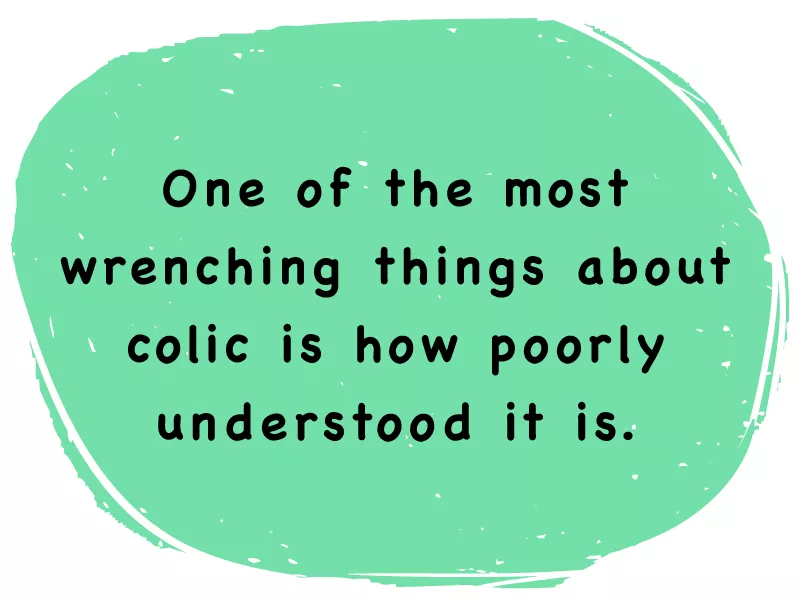
Colic has long been defined by the rule of three: crying — frequently a very agitated cry, often accompanied by the baby stiffening his legs, making fists, or passing gas — for more than three hours a day, three days a week, for three straight weeks in an otherwise healthy, well-fed baby.
But some, like Barry Lesser, who founded the Infant Behavior, Cry and Sleep Cilnic—also known as the Colic Clinic — at Brown University’s Alpert Medical School and Woman and Infants Hospital, expand that understanding to include any excessive, intense crying that affects the child’s development or the parents’ well-being or feelings toward their baby.
It’s typically diagnosed only by exclusion — that is, after a doctor has ruled out anything else that might be at play. Colic generally peaks at about six weeks, and usually resolves by three to six months of age, though, rarely, it can last longer.
One of the most wrenching things about colic is how poorly understood it is, and to this day, what causes colic remains a mystery. Current thinking includes myriad potential causes: an very sensitive temperament, an underdeveloped nervous system, a baby who is easily over-stimulated, irritation caused by the mother’s diet in breastfed babies or certain proteins in formula-fed babies, overfeeding, gastrointestinal immaturity or inflammation.
And with so many potential causes, potential solutions run the gamut too.
What It’s Not
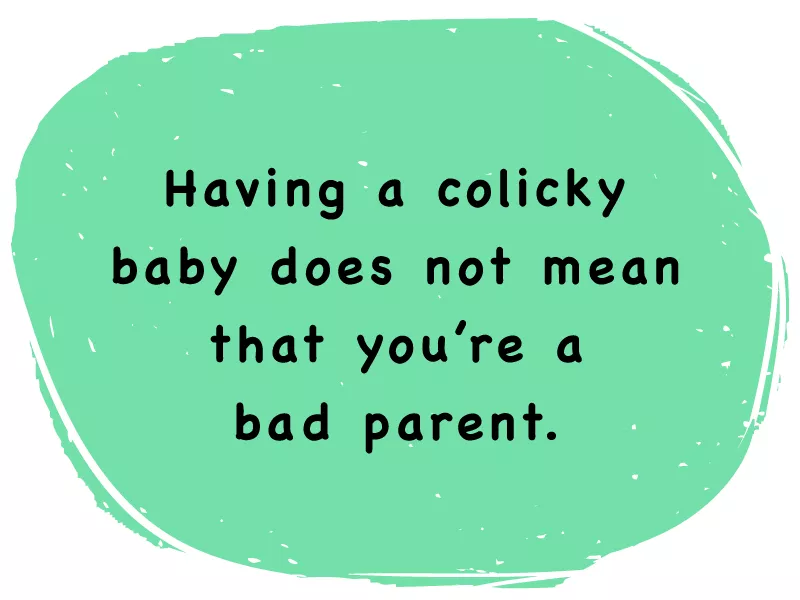
Colic is not dangerous; it is benign, and self-resolving.
It is not simply gas, though colicky babies are frequently gassy, thanks to all that air they’re sucking down in between screams. Nor is colic the same as GERD or reflux: your doctor should be able to either rule out those conditions or treat them.
Symptoms such as fever, vomiting, and lethargy are not indicative of colic and are more serious: if your baby exhibits any of these, you should consult your doctor immediately.
Having a colicky baby does not indicate that you are being punished for doing something really bad in a past life (not as far as we know, anyway) — and it definitely does not mean that you’re a bad parent.
Once more: Having a colicky baby does not mean that you’re a bad parent.
Tips For Feeding

Try feeding your baby smaller meals, but more frequently, to alleviate gas buildup. Getty Images
Babies’ tummies are tiny, and keeping a couple tips in mind might help to alleviate belly-related colicky upset.
Try feeding your baby smaller meals, but more frequently, to alleviate gas buildup caused by the breakdown of lactose. Also, make sure to burp your baby well after each feeding, and hold her upright as often as possible.
The American Pregnancy Association suggests that breastfeeding mothers make sure one breast is emptied before offering the other (or only offering one breast per feeding) to ensure that baby gets plenty of hindmilk, which might reduce colic symptoms.
Burrito Supreme

A nice tight swaddle might calm your baby when he’s in the throes of a crying episode. Getty Images
Just as the shushing/white noise mimics the sound of the womb, swaddling mimics its coziness. Think about it: your babe didn’t have a whole lot of square footage in there, and the big world in all its wide-open vastness can feel really overwhelming in comparison. A nice tight swaddle might calm your baby when he’s in the throes of a crying episode, and will prevent a sleepy baby from flailing himself back awake.
Molly Tooley says swaddling was a lifesaver when dealing with her daughter Summer’s colic.
“Trusting my mommy intuition, I knew it wasn’t tummy trouble even though everyone said it was. I honestly think she was just very sensitive,” she says. “We tried everything, and [one of the only things] that worked for us was a tight swaddle.”
Much Ado About Shushing
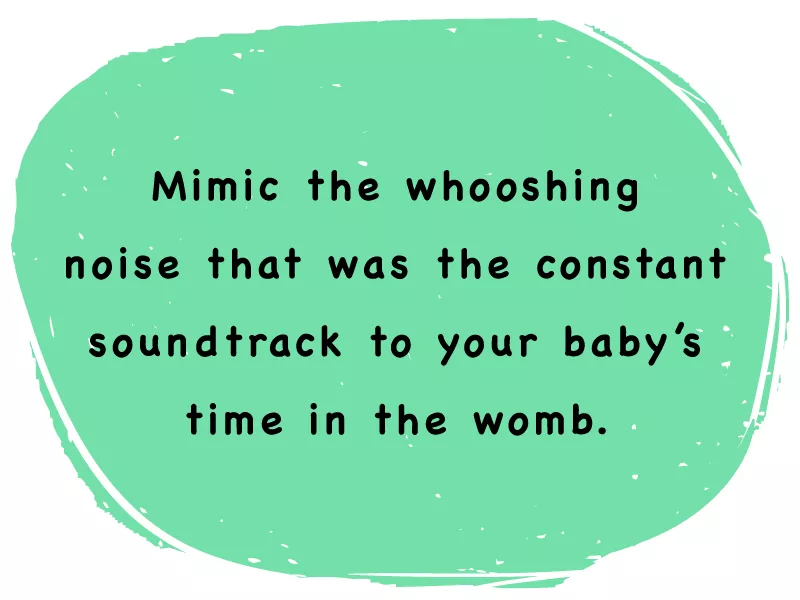
Pediatrician Harvey Karp, author of “Happiest Baby On The Block,” advocates loud shushing in order to mimic the whooshing noise that was the constant soundtrack to your baby’s time in the womb. Karp recommends shushing as loudly as your baby is crying, turning down the volume as the child calms.
And you can always outsource some of the work: white noise machines and apps like White Noise Baby offer similar benefits, as do household appliances like the clothes dryer, hairdryer, or vacuum cleaner.
The Football Hold

The so-called football hold can help the baby eliminate some discomfort. Getty Images
Again, while gas does not cause colic, all that crying might mean your baby is swallowing a lot of air, which can cause gas and related pain. The so-called football hold — placing the baby tummy-side down along your forearm with her cheek sitting in the palm of your hand, and her body resting up your arm towards your elbow — can help the baby eliminate some of that discomfort.
And, as with so many of these colic-taming strategies, this tactic also employs a bit of distraction, simply because it’s not the way you usually carry your kiddo.
Similarly, the “bicycle pump” can relieve gas and tummy pain: with your baby face-up on your lap with his legs toward your crotch and his head on your knees, pump his legs up and down and in and out in a bicycling motion.
Road Trip

Sometimes a change of scenery is all it takes to calm a wailing babe. Getty Images
Sometimes a change of scenery is all it takes to calm a wailing babe. Whether in the stroller for a walk and a dose of fresh air and the strange and exotic sounds of your neighborhood, or into the car seat for a long drive, sometimes the stimulation offered by a different environment is enough to lull a kid into calm.
(Conversely, if you’ve been out and about all day when your little one starts melting down, some downtime indoors might do the trick.)
Pro tip: Whether in the car or in a stroller, take the bumpy route: The sensations—the vibrations as well as the sounds—your baby experiences when you’re rolling over bumpy terrain might distract him right out of his funk.
Don’t Fear the Paci!
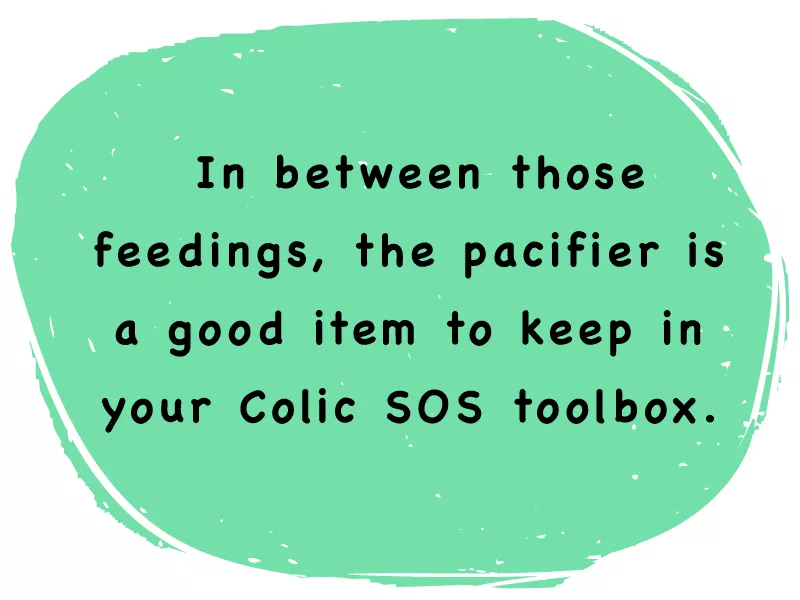
While your milk is surely irresistibly tasty, that’s not the only reason nursing works to settle your babe: the act of sucking itself is actually quite calming.
During the time when your baby is in the throes of colic, she’ll probably still be eating very frequently — every two to three hours is standard — and that’s as it should be.
But in between those feedings, the pacifier is a good item to keep in your Colic SOS toolbox — it will offer her that soothing sucking sensation, but can prevent her from getting in the habit of treating your breasts like a 24-hour snack bar, which is a boon now and later. Too frequent eating can cause gassy buildup, and grazing can be a tough pattern to break.
‘Motional Rescue

Many parents of colicky babies have found that the rhythmic motion offered by infant swings can work magic. Getty Images
Movement is soothing for babies, and many parents of colicky babies have found that the rhythmic motion offered by infant swings can work some legit magic, frequently soothing an upset baby quickly and keeping her calm for a while. There are tons of options on the market; most offer various speeds and some include lights, mobiles, mirrors, and other features that can help to distract the shrieks right out of your baby.
For a lower-tech alternative, hold your baby close to your chest or place her in an infant carrier, have a seat on a big exercise ball, and bounce.
About Your Diet…
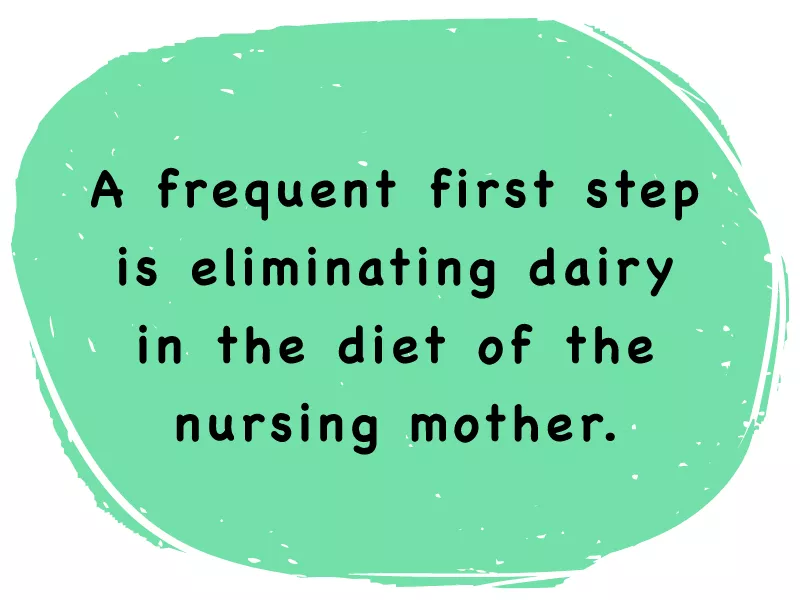
Many breastfeeding mothers are encouraged to keep a food/cry diary to try to determine a correlation between what they’re eating and their child’s fussiness, or to attempt a standard allergen-restricted diet, which excludes cow’s milk, eggs, peanuts, tree nuts, wheat, soy, and fish.
Other culinary suspects include caffeine, spicy food, and gassy foods like Brussels sprouts and cabbage.
But before you attempt to subsist on apples alone, talk to your doctor. A frequent first step is eliminating dairy in the diet of the nursing mother (or switching to a hydrolyzed formula for formula-fed babies) — and if your diet is indeed to blame, that one change may be all you need.
Ask for Help

You’ll be no good to your child if you’ve pushed yourself to the breaking point. Getty Images
It is critical that you take care of yourself. Such advice might feel impossible or even ridiculous, given that you have a precious new person to keep alive and everything, but you’ll be no good to your child if you’ve pushed yourself to the breaking point. And colic can indeed break a person.
So ask for help. Even if it’s just having a friend come over to hold your kid for 15 minutes while you go to your room and have a good cry yourself, take it. (And don’t worry that your friend won’t be able to handle it: the magic of genetics means our own baby’s cries are infinitely more upsetting than those of any other baby. And besides, your pal knows that her time with the screaming creature is finite and soon she will get to go home.)
If the wailing’s gone on too long and nothing seems to be helping and you feel yourself getting angry or frustrated or crossing over into bleary-eyed, heartbroken, desperate insanity, put down the baby and walk away. She will be safe in her crib or bassinet for a couple of minutes while you remove yourself and take some deep breaths or get a glass of water or sob into your pillow.
And if that doesn’t help, don’t be afraid to use resources like a local crisis hotline. The people on the other end will know how to help, or point you in the direction of experts who do.
Pump Up the Gut

Infant probiotics are recommended as something that can help the colicky babe. Getty Images
Increasingly, infant probiotics are recommended as something that can help the colicky babe.
American Family Physician reports that, based on two meta-analyses and one systematic review, administering five drops of the probiotic Lactobacillus reuteri (L. reuteri) daily was found to substantially reduce colic symptoms, but only for breastfed babies.
Desperate Times Call For Desperate Measures
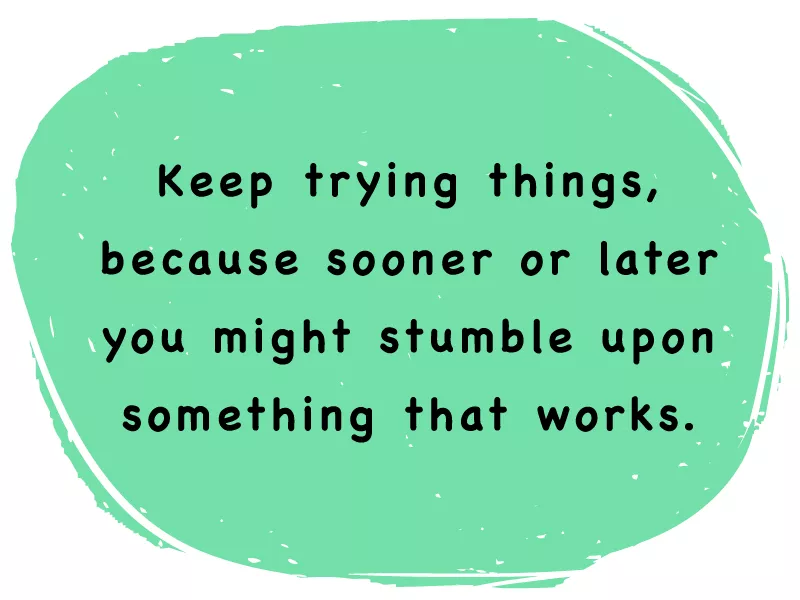
Spend every waking hour a-bounce on that giant exercise ball. Sing “Itsy Bitsy Spider”on a constant loop. Make an offering to the appropriate voodoo goddess or patron saint. In short: keep trying things, because sooner or later you might stumble upon something that works.
“We tried everything—probiotics, no dairy for mom for weeks,” says mom Elizabeth Maxwell Tashman. “My husband had success with dancing to the Beach Boys.”
And while one child’s magic bullet is falsetto harmonizing in songs about surfing, another’s might be something more exotic.
“We had brief luck with Spanish guitar music,” says Ashley Hayes. “So random but once it worked… it was a mad dash to find all Spanish guitar Spotify playlists.”
And thousands of YouTube viewers think Dr. Robert Hamilton’s unique baby-holding technique, demonstrated in this video, is worth a try.
What Not to Do

Herbal supplements can be dangerous and should never be used without consulting your doctor. Getty Images
While gripe water and anti-gas simethicone drops have never been proven effective, they’re generally considered safe.
But other medications, as well as herbal supplements, can be dangerous and should never be used without consulting your doctor.
The Good News
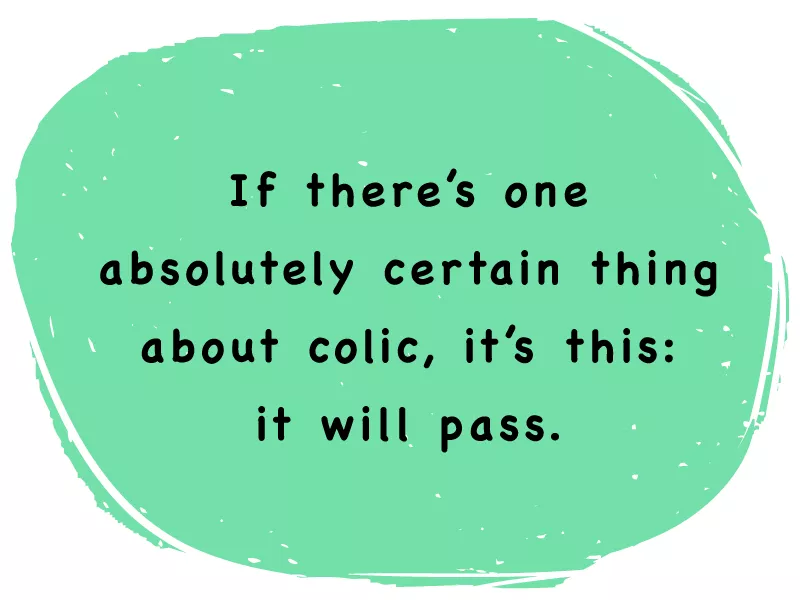
Getty Images
If there’s one absolutely certain thing about colic, it’s this: it will pass.
The American Pregnancy Association reports that colic ends for 50 percent of cases at around three months and in 90 percent by nine months.
And, like clouds parting to reveal the blue skies that they’d hidden for so long, when that colicky stage reaches its end, you will be stunned at what a cakewalk taking care of your baby is… Comparatively speaking, of course.
Until the terrible twos kick in.